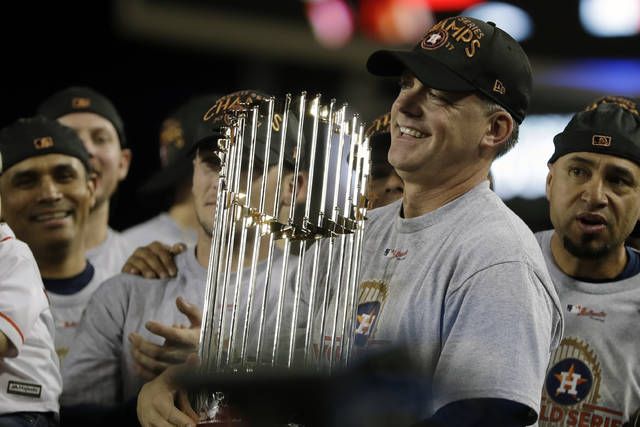
In this Nov. 1, 2017 photo, Houston Astros manager A.J. Hinch holds the championship trophy after Game 7 of baseball’s World Series against the Los Angeles Dodgers, in Los Angeles.
AP file photo
Click here to subscribe today or Login.
Kids often emulate their role models — whether it’s a parent, a teacher or a sports hero. And the youngsters who don the uniforms and rush to the diamond for Little League games want to be like the giants that play in the big leagues. This goes all the way down to the name of their team.
Bob Bertoni, the head of District 16/31 Little League which covers Northeastern Pennsylvania, posted on the district’s Facebook page warning teams not to take the name of the Houston Astros in the wake of a cheating scandal. As staff writer Kevin Carroll reported Thursday, the Astros were found to have been stealing signs during the 2017 season, and possibly throughout 2018 and 2019. Bertoni’s decision behind the name ban was influenced by Little League’s own set of values.
“Our Little League pledge says that we will ‘strive to play the game fair,’” Bertoni said. “Our young players look up to these Major Leaguers, and the Astros certainly don’t reflect fair play.”
Bertoni makes a good point about how the big leaguers influence these young athletes. If cheaters win, what would stop Little League players from doing the same? After all, the Astros won the 2017 World Series while allegedly stealing more than bases.
“The Astros, in my mind’s eye, are cheaters,” Bertoni said. “We don’t want to represent them in any way.”
The reasoning behind banning the Astros’ name is valid, and the league took swift action before the 2020 season unfolds in the spring and summer. This also comes shortly after two Little League districts in southern California earlier this month initiated the Astro ban and started what possibly could be a national movement. And an area athletic retailer will not stock Astro jerseys and other apparel in its store.
But this is not only time in which Little League took a stand on an issue that its grownup counterparts did not. In 2019, Little League International, which overlooks all the leagues, prohibited the use of team names and mascots that are racially insensitive or derogatory. This ban includes logos and names of First Nation groups. Jefferson Keel, then-president of the National Congress of American Indians and a member of the Chickasaw Nation, applauded the move.
“Little League International molds not just the athletic talents but also the minds of so many young people across America, so its new rule will go a long way towards fostering greater understanding of our common humanity and the diversity that makes this country great,” Keel said.
The Atlanta Braves and the Cleveland Indians still have their names, but their racist mascots have been retired. Other sports have similar issues, but the path to change has been very slow.
Banning the Astros’ name acknowledges how much the actions of sports idols can impact the youth. What Little League has done in the past year also shows that adults have a lot to learn.
— Times Leader




